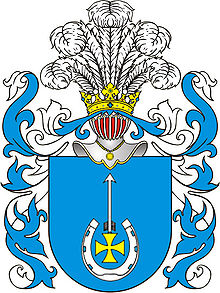Białynia is a Polish coat of arms. It was used by several szlachta families in the times of the Kingdom of Poland and the Polish–Lithuanian Commonwealth.
| Białynia | |
|---|---|
 | |
| Details | |
| Battle cry | Białynia |
| Alternative names | Bielina, Bialina |
| Earliest mention | 1332 |
| Towns | none |
| Families | 44 names altogether: Białecki, Białobłocki, Białobocki, Białynicki, Biłuński, Birula, Biwil, Bordziłowski, Ceprzyński, Chołodecki, Ciekawy, Czubik, Dziećmarowski, Dziedziel, Eynarowicz, Ginejko, Golimiński, Harbuz, Jaszczechowski, Kowerski, Kutkiewicz, Ławrynowicz, Ławrynowski, Męczkowski, Mirski, Nowochoński, Odroclew, Pasenko, Poszylski, Rzepecki, Rzepnicki, Rzepniewski, Rzepnik, Sulkowski, Suszko, Światopełk-Mirski Szuszko, Wilczek, Wojcikiewicz, Wójcik, Wóycikiewicz, Wóycikowski, Zabłocki, Zdanowicz, Zyżniewski, Żyźniewski, Żyżniewski |
History
editThis coat of arms was acquired in Poland in 1332 during the last year of the reign of Władyslaw Łokietek (Władysław I the Elbow-high). The king led an expedition against the Knights of the Teutonic Order (Teutonic Knights). When the army reached the enemy's camp, a knight of the house Jastrzębiec concealed flaming arrows from the night watch and torched the enemy's tents. The fire enabled the king's army to rout and kill the enemy with dispatch. The knight's ingenuity was rewarded with the addition of an arrow to the family's coat of arms which was then named for the village, Białynia, near which the action took place. The talked of expedition likely took place during the famous Battle of Płowce which occurred on 27 September 1331.
Blazon
editA white horseshoe with its ends pointing upwards with a cross in the middle on a shield, above the cross an arrow flying upwards upon a blue background. Five ostrich feathers on the knight's helmet.
Variations
editA number of variations of the Bialynia coat of arms appeared for different families.
-
Bialynia coat of arms in Baranow-Sandomierski castle
-
Chołodecki
-
Mirski
-
Białobłocki
-
Białobłocki (odm)
-
Ejnarowicz
Notable bearers
editNotable bearers of this coat of arms include:
See also
editReferences
edit- Gajl Tadeusz "Herbarz polski od średniowiecza do XX wieku", 2007 ISBN 978-83-60597-10-1